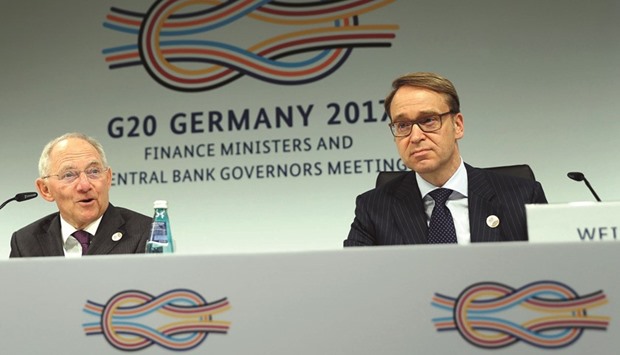The world’s financial leaders rowed back on a pledge to keep an open and inclusive global trade system after being unable to find a suitable compromise with an increasingly protectionist United States.
Making only a token reference to trade in their communique, finance ministers and central bank chiefs from the world’s top 20 economies broke with a decade-long tradition of endorsing open trade, a clear defeat for host nation Germany, which has fought to maintain the G20’s past commitments.
In the new US administration’s biggest clash yet with the international community, G20 finance chiefs also rowed back on a pledge to support climate change finance, an anticipated outcome after US President Donald Trump called global warming a “hoax”.
“We are working to strengthen the contribution of trade to our economies,” G20 finance chiefs said after a two-day meeting in the German resort town of Baden-Baden, well short of a past commitment for rules-based, transparent, non-discriminatory, open and inclusive multilateral trade.
Seeking to put “America first”, Trump has already pulled out of a key trade agreement and proposed a new tax on imports, arguing that certain trade relationships need to be reworked to make them fairer for US workers.
US Treasury Secretary Steven Mnuchin, who represented the Trump administration in his first G20 meeting, earlier said it had no desire to get into trade wars but trade needed to be made fairer, a reference to big trade deficits with key G20 members, such as Germany and China.
After meeting German Chancellor Angela Merkel on Friday, Trump said he did not believe in isolationism but that trade policy should be fairer.
International trade makes up almost half of global economic output and officials said the issue could be revisited at a meeting of G20 leaders in July.
The communique also dropped a reference, used by the G20 last year, on the readiness to finance measures against climate change as agreed in Paris in 2015, because of opposition from the United States and Saudi Arabia.
Trump has suggested global warming was a “hoax” concocted by China to hurt US industry and vowed to scrap the Paris climate accord aimed at curbing greenhouse gas emissions.
Trump’s administration on Thursday proposed a 31% cut to the Environmental Protection Agency’s budget as the White House seeks to eliminate climate change programmes and trim initiatives to protect air and water quality.
Asked about climate change funding, Mick Mulvaney, Trump’s budget director, said on Thursday: “We consider that to be a waste of money.”
The G20 did, however, show continuity in its foreign exchange policies, using past phrases on currency markets.
“We reaffirm our previous exchange rate commitments, including that we will refrain from competitive devaluations and we will not target our exchange rates for competitive purposes,” the G20 said.
Leaders also upheld their commitments to financial sector regulation, supporting the finalisation of bank rules known as Basel III, provided they do not significantly raise overall capital requirements.
Meanwhile the finance chiefs of the world’s top 20 economies pledged yesterday to finalise new banking regulations, easing concerns that the new US administration would pull out of a long-delayed global accord known as Basel III.
Designed to avert a repeat of the financial crisis, Basel III rules have been on hold due to an impasse between the United States and Europe, with some fearing the accord might never be revived as the new US administration advocates deregulation.
“We confirm our support for the Basel Committee on Banking Supervision’s work to finalise the Basel III framework without further significantly increasing overall capital requirements across the sector, while promoting a level playing field,” G20 finance ministers and central bank chiefs said in a statement.
US President Donald Trump has ordered a review of banking rules with the implicit aim of loosening them.
That raises the prospect of the US pulling out of some international cooperation efforts.
Arguing that lax regulation had been a key cause of the global financial crisis a decade ago, the European Central Bank said deregulation threatens the relative stability that has supported the slow but steady recovery.
With central banks keeping rates ultra low, deregulation also risked overheating the bank sector, raising the prospect of failures and bailouts, European officials argued.

German Bundesbank President Jens Weidmann (right) and German Finance Minister Wolfgang Schaeuble address a news conference at the G20 Finance Ministers and Central Bank Governors Meeting in Baden-Baden, Germany. The world’s financial leaders rowed back on a pledge to keep an open and inclusive global trade system after being unable to find a suitable compromise with an increasingly protectionist United States.


